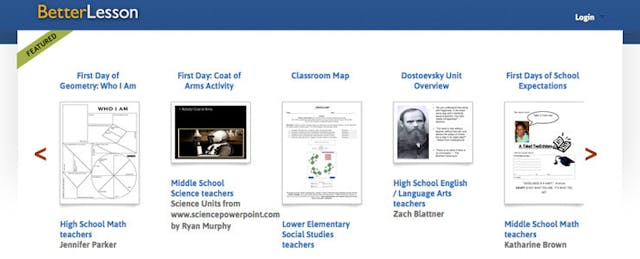BetterLesson, which started by offering free lesson plans, took a big step toward broadening its reach by teaming with the National Education Association to capture how "master teachers" teach. "The most important part of this is we're providing teachers with the direct resources that are going to make a difference for them and for kids," says Bill Raabe, Senior Director of the NEA's Center for Great Public Schools. NEA is providing $3.6 million for the program.
All the materials developed in the program will be available via the BetterLesson site, free of charge.
The program is modeled after a similar program that the for-profit BetterLesson announced last November when it received $3.5 million from the Bill & Melinda Gates Foundation. At that time, BetterLesson said that it was going to identify master teachers who teach math in grades 6 through 12 and capture "the full sweep of their instructional practices." The teachers would commit to work with BetterLesson for two years, sharing resources (such as lesson plans), letting videographers capture how they teach, and sharing reflections on their teaching practices.
Put another way: BetterLesson and its supporters hope to demonstrate "how" great teachers lead their students--not just "what" they use to do it.
For its part, BetterLesson committed to making available coaches who would work with the teachers to ensure that their lessons were aligned with the Common Core standards. And the teachers would receive $30,000 over the two years for their work.
The program with NEA is similar, though speeded up: Together BetterLesson and NEA will identify 95 master teachers who either teach math in grades K through 5 or are English Language Learners specialists in all grades. These teachers will work with BetterLesson for a year, contributing one lesson for every day of instruction, and a narrative component that will break down how they implement those lessons, says Alex Grodd, cofounder and chief executive of BetterLesson. Over the course of the year, videographers will capture five lessons. And they'll be paid $15,000 for their work.
Since BetterLesson kicked off the program funded by Gates in November, it's been working with 28 teachers who have shared their lessons and practices; they'll be creating reflections on the teaching practices next year, says Erin Osborn, cofounder and chief operating officer at BetterLesson. (BetterLesson has also recruited a "second cohort" of 14 teachers who are just getting started.)
"What we're trying to do is frame a living breathing body of knowledge around effective teaching," says Osborn. "We feel that's been missing. When they get feedback that they're not doing a great job -- often they're just told to read an article or go watch a video or take a webinar. We're trying to give teachers access to the full richness of their instruction."
In order to deliver the new content, BetterLesson has built an entirely new site, Grodd says. He expects to launch the site as a private beta at the end of the summer.
NEA and BetterLesson are also on a quick path to identify the 95 master teachers, says NEA's Raabe. Applications from interested teachers are due by July 15 and available here.
Raabe adds that NEA will discuss the program at its annual meeting next week, which typically draws 9,000 teachers. He hopes to attract several hundred applications for the program, from which the NEA will select the final 95 participants.
"This is really ambitious work and we feel like having great partners is really important," says Osborn. "The NEA is serious about transforming the union and having the union transform the work of teachers."
She emphasized that BetterLesson will be providing coaching to the teachers involved in the program to ensure that their lessons and teaching practices are deeply rooted in the Common Core. "Teachers tell us they're excited about this professional opportunity," she says.
And both BetterLesson and NEA said they expect that the partnership will continue as states move to standardized science curriculum.
"Our business model has been about making all our resources free for teachers," says Grodd. "Teachers will get free access to all our content." BetterLesson has built revenue around selling a premium layer to school districts starting the KIPP. Grodd says he expects that premium layer will evolve. "We're looking at 'structured engagement,' ways to help teachers engage with body of knowledge, track their milestones and so on," he says.
Raabe says the NEA is excited about using the program to recognize exceptional teachers and provide them with professional development and the opportunity to become teacher leaders.
More than a year ago, the American Teachers Federation, launched ShareMyLesson, a website where teachers can share resources. Other resources include the Teachingchannel.org, LearnZillion and Edutopia.org.
"Our master teachers are making use of every web app and resource out there," says Osborn. "We want to capture how they use a diverse set of resources. Maybe they'll use a resource from ShareMyLesson. Some using Khan Academy; others use an abacus. It's the whole sweep from techie to nontechie."


